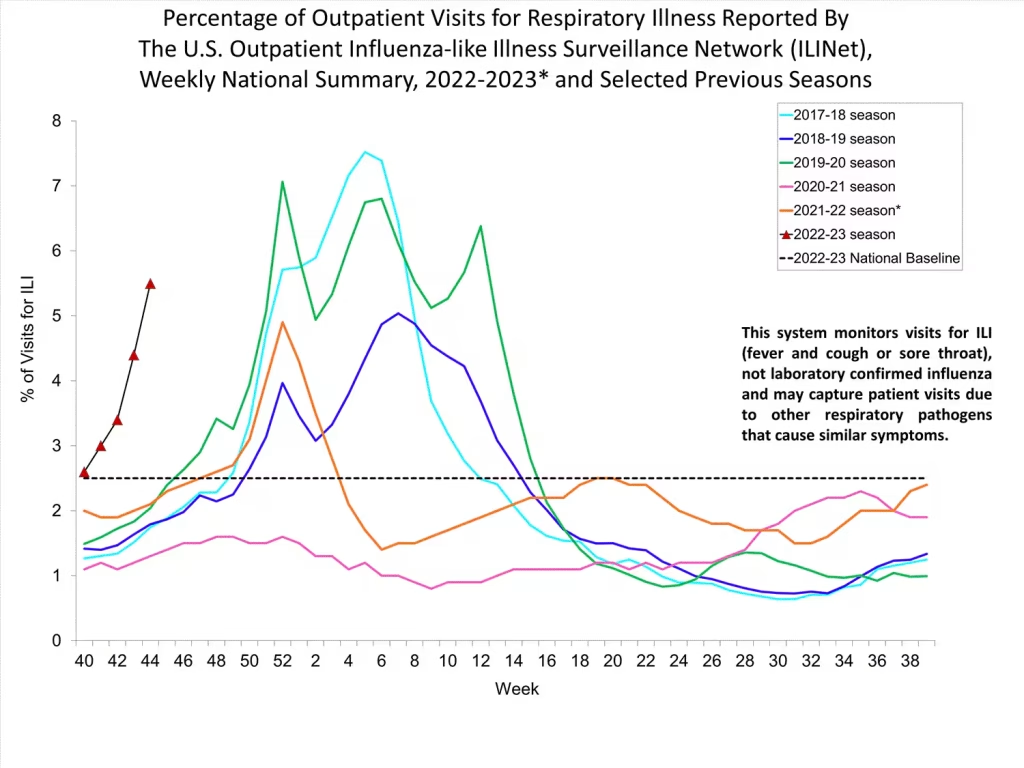Illinois is witnessing a significant rise in flu cases and other respiratory illnesses, according to the Illinois Department of Public Health (IDPH). Though respiratory illness levels dropped briefly for a week, they have now surged again, jumping from a moderate to a high level. This increase is largely due to a rise in emergency department (ED) visits and hospital admissions related to the flu.
The Current Situation in Illinois
The week ending January 25 saw a noticeable shift in the number of hospital visits. While emergency room visits for COVID-19 and Respiratory Syncytial Virus (RSV) had decreased, the flu cases surged dramatically. Data from the IDPH reveals that for the week ending January 25, the flu was three times more prevalent in hospital admissions than COVID-19. The flu accounted for 4.6% of hospital admissions, compared to just 1.6% for COVID-19. RSV, a common respiratory illness affecting young children, was responsible for only 0.7% of hospital admissions.
Almost 20% of all emergency department visits were related to acute respiratory illnesses, which is a broad category that includes the flu, COVID-19, RSV, and other similar conditions. Of these visits, 7.8% were attributed to the flu, 1.6% to COVID-19, and 0.7% to RSV.
IDPH’s Close Monitoring of Respiratory Illnesses
The IDPH has been closely monitoring respiratory illness data this season and continues to issue updates on the state’s flu and virus activity. Dr. Sameer Vohra, the IDPH Director, shared his concern about the increasing flu cases. He emphasized that flu remains a serious health threat, particularly for vulnerable groups. “Flu continues to circulate widely across Illinois,” Dr. Vohra stated. “I recommend that all those over 65, very young children, individuals with chronic disease, and those who are immunocompromised, use all the tools at their disposal to prevent exposure.”
The Importance of Vaccination and Early Treatment
Public health officials are strongly advising everyone who has not yet been vaccinated against the flu to get vaccinated as soon as possible. They stress that flu shots take about two weeks to provide full protection, so early vaccination is crucial to ensure maximum immunity. Health experts emphasize that the flu can cause severe complications, especially among the elderly and those with pre-existing health conditions, making vaccination essential for at-risk groups.
In addition to vaccination, officials urge people to seek medical attention promptly if flu-like symptoms appear. According to Dr. Vohra, antiviral medications are most effective if taken within 48 hours of the onset of symptoms. “If you do develop flu-like symptoms, contact your healthcare provider and seek treatment right away,” he advised. “Antiviral medication is most effective if initiated less than 48 hours after your symptoms begin.”
The Rise in Pediatric Flu Cases
Another worrying trend is the increase in pediatric deaths related to flu this season. The IDPH Respiratory Illness Dashboard reports that five pediatric deaths have occurred so far due to the flu. Additionally, three children have died from RSV, while one child died from a combination of both RSV and COVID-19. These fatalities highlight the seriousness of these respiratory illnesses, especially among young children, whose immune systems may be more vulnerable to the effects of the flu and other viruses.
The flu’s impact on children and the elderly underscores the importance of both prevention and early intervention. Pediatricians and public health experts are particularly concerned about the possibility of more flu-related deaths as the season progresses. With the rise in hospital admissions and emergency department visits, hospitals across Illinois are bracing for continued pressure as more people seek care for flu and other respiratory symptoms.
Preventing the Spread of Respiratory Illnesses
Along with getting vaccinated, public health officials urge Illinois residents to follow basic hygiene practices to prevent the spread of respiratory illnesses. This includes washing hands frequently, covering coughs and sneezes, and staying home when feeling sick. These simple steps can significantly reduce the chances of spreading viruses to others, particularly in crowded or indoor settings where germs can spread quickly.
For individuals who are at higher risk for severe flu complications, including those with chronic illnesses such as asthma, heart disease, or diabetes, taking extra precautions is especially important. Limiting contact with large groups of people and maintaining a healthy lifestyle with proper diet and exercise can help improve immunity and reduce the likelihood of getting sick.
The Future of Flu and Respiratory Illnesses in Illinois
As Illinois enters the peak of the flu season, the IDPH will continue to monitor trends closely and provide regular updates on the state’s respiratory illness data. While the situation remains fluid, the rise in flu cases and hospital admissions is a reminder of how quickly seasonal viruses can spread. Public health experts are hopeful that increased vaccination rates, early intervention, and consistent hygiene practices will help control the spread of the flu and other respiratory illnesses as the season continues.
Conclusion: Stay Safe and Get Vaccinated
In summary, the flu is spreading rapidly across Illinois, with a notable increase in hospital admissions and emergency visits related to the virus. Public health officials are urging residents to get vaccinated, particularly those in high-risk groups, and to seek treatment if flu symptoms develop. With pediatric deaths from the flu, RSV, and COVID-19 already reported, it’s clear that these illnesses are serious, and everyone should take steps to protect themselves and their loved ones.
As the respiratory season continues, staying informed and following public health guidelines will be key in preventing the further spread of flu and other respiratory viruses. Everyone is encouraged to take action now to protect themselves and others, especially the most vulnerable members of the community.
Disclaimer – Our editorial team has thoroughly fact-checked this article to ensure its accuracy and eliminate any potential misinformation. We are dedicated to upholding the highest standards of integrity in our content.





More Stories
Flu Cases and Respiratory Virus Numbers Soar in Illinois
Flu Cases and Respiratory Virus Numbers Soar in Illinois
Flu Cases and Respiratory Virus Numbers Soar in Illinois